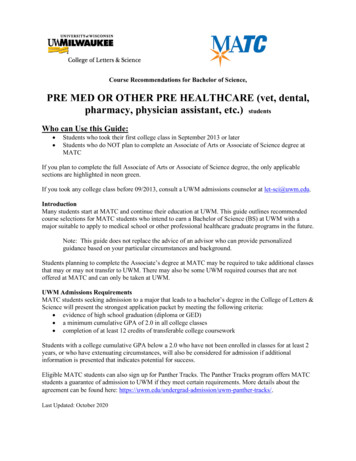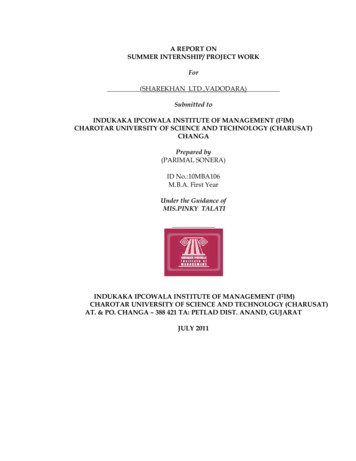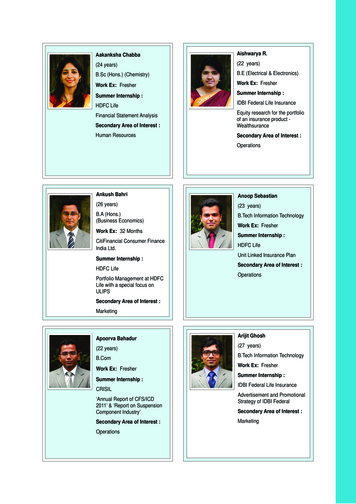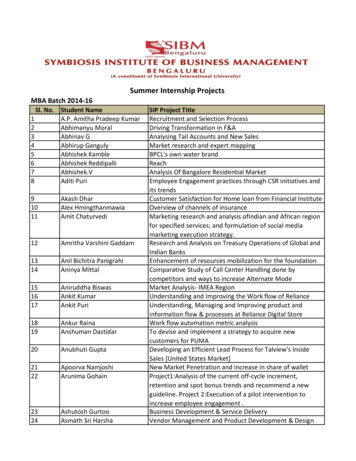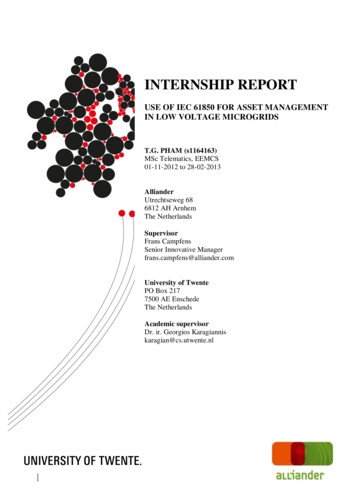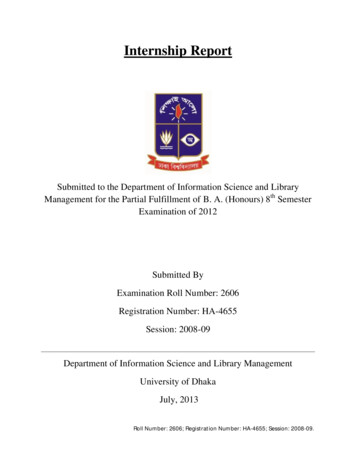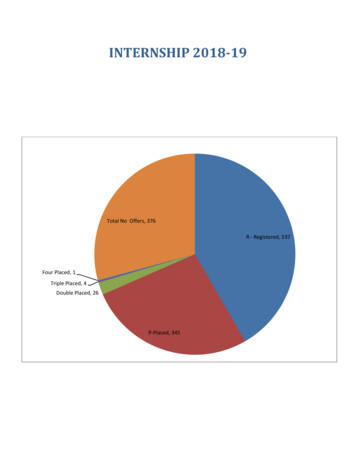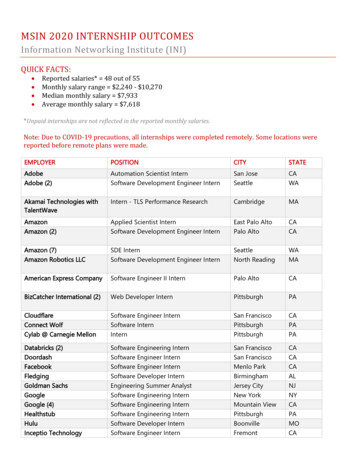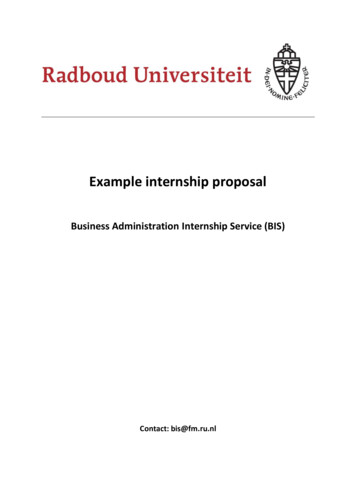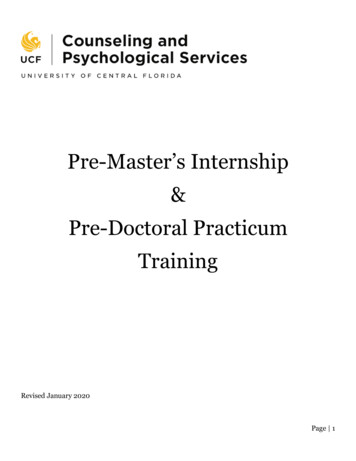
Transcription
Pre-Master’s Internship&Pre-Doctoral PracticumTrainingRevised January 2020Page 1
ContentsThe Training Setting . 4Model of Training & Core Competencies . 4Components of our Training Philosophy. 5Training Goals .7Training Activities . 8Direct Service. 8Supervision . 9Training Activities .10Program Duration.10Eligibility Issues. 11Application Procedure . 11Contact . 12Trainees . 12Page 2
Welcome LetterGreetings! Welcome to the University of Central Florida Counseling and Psychological Services(CAPS). I am delighted that you have taken the moment to look at our training program.Encompassed within our training is the pre-master’s internship as well as pre-doctoral practicumtraining program. I hope that when you review our website, you obtain all of the information you needto make a decision. If you have any questions, please feel free to contact me. Best wishes!Sincerely,Dr. Anna King, Psy.D.Associate Director/Training Director/Licensed PsychologistCounseling and Psychological ServicesUniversity of Central FloridaP.O. Box 163170Orlando, FL 32816-3170Phone: (407) 823-2811 FAX: (407) 823-5415Email: Annatolee.King@ucf.eduPage 3
The Training SettingCounseling and Psychological Services (CAPS)CAPS is a department within UCF’s Division of Student Development and Enrollment Services.Students come to CAPS with an array of developmental and mental health concerns ranging fromadjustment issues to various kinds of severe psychological disturbance. Services offered by CAPSinclude brief individual and couples counseling, referrals, consultation, group therapy, workshops,crisis intervention, developmental programming and presentations, and psychological assessment.CAPS currently has 6 administrative staff (Director; Associate Directors of Clinical Services, Outreach& Community Intervention, and Training; Assistant Directors of Clinical Services and Administration& Innovation), 26 staff clinicians, 6 support staff, and Bodhi, our animal-assisted therapy dog. Pleasesee our UCF CAPS Staff Website for more information.CAPS provides training and supervision for graduate students from departments of ClinicalPsychology, Counseling Psychology, Counselor Education, Mental Health Counseling and SocialWork. Graduate students participating in our pre-masters internship & pre-doctoral practicumtraining at CAPS are regarded as “Trainees.” Graduate students participating in our APA-accrediteddoctoral internship in health service psychology program are regarded as “Interns.” Individuals whohave completed their doctoral degree in psychology but are contracted for a one-year fellowship yearare regarded as “Postdoc Fellows.”CAPS is open 8-6 pm on Mondays-Thursdays and 8-5 pm on Fridays during the Fall and Springsemesters. During the summer semester, CAPS is open Monday-Friday from 8-5 pm. CAPS isBuilding 27 on the UCF campus.Model of Training & Core CompetenciesThe UCF CAPS Pre-Master’s Internship & Pre-Doctoral Practicum Training program prepares stronggeneralists in the practice of psychology. CAPS' training program utilizes a practitioner-scholardevelopmental model. Trainees learn by observing, practicing skills, and consulting scholarlyresearch. This model entails a focus on service delivery with professional development being viewedas sequential in nature, and with the goal of helping trainees move toward greater levels of autonomyby the completion of the training program. This model also includes an emphasis on experientiallearning which allows trainees to learn through concrete experience, reflective observation, activeexperimentation, and an establishment of mentoring relationships where training is viewed asrelational and reciprocal. There are certain developmental markers that indicate movement towardbecoming a competent therapist over time (Stoltenberg and Delworth, 2009; Competency BenchmarkDocument, 2008).Page 4
Components of our Training PhilosophyMentoring and ModelingAn important aspect of our training philosophy is the importance of mentoring and modeling.Consistent with our practitioner-scholar-developmental model of training, trainees haveopportunities to work collaboratively with professional staff members who represent diverse trainingdisciplines including psychology, mental health counseling, social work, marriage and family therapy,and psychiatry. Our training program endorses an “open-door policy,” encouraging trainees tointeract with staff who function in a variety of roles such as mentor, supervisor, consultant, teacher,advocate, and administrator. Mentoring occurs through a progressive and experiential “learning bydoing” process that is augmented by close supervision, co-facilitation and co-presentationopportunities and shadowing of staff during clinical or programmatic activities. Mentoring also occursin the context of didactic training activities, staff meetings, project collaborations, and informalconsultations with center staff. This range of experience allows trainees to gain exposure to a varietyof styles and perspectives, to expand their clinical and conceptual repertoire, and to cultivate areas ofinterest or specialty. In our approach to mentoring trainees, we strive to model professional behaviorsand demonstrate our commitment to ethical practice and all types of diversity. In addition, we striveto model open and healthy communication, critical thinking skills, self-care, continuing educationand lifelong learning, and active membership in professional organizations.Socialization Process & Professional IdentityAnother tenet of our philosophy is based on our belief that the training year is a time when a criticalsocialization process occurs for trainees. This process helps foster the emergence and integration of aprofessional identity which is essential during their important transition from graduate student topracticing professional. We believe that a professional identity entails balancing of multipleprofessional roles and responsibilities, effective communication with clients and colleagues, anddevelopment of sound judgment and personal maturity. It also encompasses awareness andadherence to professional and ethical conduct, consolidation of theoretical orientation, and the abilityto work collaboratively within larger systems. The socialization process of trainees occurs in thecontext of daily interactions, formal supervision and training activities, and through professionalrelationships with members of the community. Developmentally, we expect trainees will enhancetheir breadth and depth of clinical skills and assume increasing levels of autonomy and independentfunctioning.Learning in a Supportive EnvironmentAnother element of our training philosophy is the belief that trainees learn most effectively in asupportive atmosphere that is professional, collegial, and encouraging. With a strong investment intraining and supervision, our training staff strives to cultivate a safe and welcoming environment inwhich trainees can grow and develop as professionals. We consider trainees as an integral part of ourstaff, and believe that trainees have as much to offer us as we have to offer them. Trainees receiveongoing mentoring, constructive feedback and evaluation which is reciprocal in nature, and ongoingencouragement to move steadily toward greater levels of independence and confidence. We are alsoaware that trainees may enter our program at different levels regarding clinical and conceptualizationPage 5
skills, practicum experience, integration of theoretical orientation, communication skills, andsensitivity to cultural diversity. As a result, we believe it is important to assess the developmental levelof trainees early on so that their training needs, interests and goals can be met during the course ofthe year.Self-AwarenessAnother philosophical premise is our belief that self-awareness is critical to the development ofeffective therapy skills as a clinician. In this regard, trainees will be asked to engage in a process ofself-reflection and personal exploration with supervisors and training staff to reflect upon how theirlife experiences, personal qualities and interpersonal dynamics relate to their clinical and therapeuticwork. Supervisors take great care to develop training relationships with trainees that arecharacterized by trust, safety and respect. As such, we believe that care should also be taken todifferentiate between therapy and supervision, and that personal exploration with trainees shouldalways be carried out with an emphasis on enhancing their therapeutic effectiveness and professionalfunctioning rather than conducting therapy with them. The use of ongoing and constructive feedbackis also essential in enhancing trainees’ self-awareness and professional growth during the year. Webelieve it is important to use a strength-based approach while also encouraging areas for continuedgrowth. This approach strikes the important balance of support and challenge in trainees’ acquisitionof clinical skill, self-awareness, and professional development.Integration of Scholarly Knowledge and PracticeAnother principle is our belief that trainees should be informed by the integration of scholarlyknowledge and research findings as it impacts clinical practice. We emphasize the consumption ofscholarly research in the application of clinical practice through training activities, didactic seminarsand professional dialogues with center training staff. We encourage trainees to gain understanding ofa variety of empirically-informed treatments and interventions, analysis of current trends in the field,and the use of critical thinking in the process of clinical decision-making.Appreciation for DifferencesA final essential theme woven throughout the entire training program is that we value openness andappreciation for all differences among individuals including center staff and interns. We believe thathonoring the richness of our similarities and differences facilitates growth and development andenhances quality of life in our community and the world in which we live. In order to effectivelyrespond to the unique needs of our diverse student population and broader campus community, weconsider our own cultural contexts including understanding of the interaction of worldviews andexperiences of oppression and privilege. As such, we are committed to promoting awareness andunderstanding of cultural diversity at all levels. We actively infuse this philosophy into the planningand implementation of all professional activities including 1) counseling services, 2) supervision andtraining, 3) programming and presentations, 4) consultation activities, 5) creation of brochures andwebsite, 6) development of policies and procedures, 7) recruitment of staff, interns, and trainees 8)continuing education and professional development, and 9) research and scholarly activity. Traineesare expected to develop enhanced multicultural competence during the year and to be skilled inaddressing the needs of the various populations we serve.Page 6
CAPS’ Diversity StatementThe staff at the University of Central Florida Counseling and Psychological Services have acommitment to providing a safe, welcoming environment for all students regardless of their gender,gender expression, ethnicity, race, language, culture, religious beliefs, sexual orientation, nationalorigin, age, size, physical and mental abilities, and/or socioeconomic status. We aim to demonstrateour view of diversity issues through our work with individual and group counseling, consultation,outreach presentations, program development, assessment, supervision, training, and research. Inour professional roles, we stand at the intersection of diversity and mental/emotional health byrecognizing the impact of diversity issues on all individuals, such as discrimination, stereotypes,oppression, prejudice, acculturation, and identity development. We make an effort to promote theacceptance and understanding of individuals with diverse backgrounds and to educate ourselves andothers on diversity-related matters. We strive to be affirming, respectful, and open minded ofindividuals with diverse backgrounds, not only among ourselves within the Center, but across thecampus community through our contact with all students, staff, faculty, and administrators. We notonly want to share this vision, but we hope to contribute to the reduction of problems such asprejudice, discrimination, and exploitation. We strive to recognize when our own diversity affects howwe may relate to or work with our colleagues and the individuals we serve. It is part of ourprofessional responsibility to gain continuing education for ourselves and our trainees regardingindividuals of diverse backgrounds. We work towards recognizing and understanding the value of oursimilarities and differences. We uphold the freedom for people to remain committed to personalvalues. Our hope is that individuals in our Center, campus, and community feel at peace to live and bethemselves.Training GoalsTrainees will gain proficiency in:1. Clinical Competence: Trainees will be able to conduct clinical interviews in which they accurately evaluate thepsychological needs of clients, make accurate diagnoses, and assess the need for briefpsychotherapy, psychiatric medication, or other psychological interventions including referralsand appropriate documentation.Trainees will be able to provide brief individual psychotherapy to diverse clients with a varietyof presenting concerns by the completion of the training program. Trainees will practiceintegrative psychotherapy and learn how to apply ideas and strategies of change from differenttheoretical approaches.Trainees will be able to facilitate theme-oriented psycho-educational groups and/or processoriented psychotherapy groups.Trainees will be able to provide crisis intervention for clients experiencing personal distress oracute symptomatology related to stress, trauma, or loss. Trainees will be able to help studentsPage 7
in crisis to reduce their immediate distress and mobilize resources. Trainees will be able tomake decisions about clients’ safety based on a risk-assessment of their danger to self andothers.2. Outreach and Consultation Competence: Trainees will be able to design and facilitate psycho-educational workshops and engage inother types of developmental programming and presentations.Trainees will be able to provide consultation with faculty, staff, parents and others who areconcerned about a student, and develop formal consultation relationships with residence lifeand other members of the campus community to help meet the needs of students.3. Individual and Cultural Diversity Competence: Trainees will be able to demonstrate multicultural competence in their work with clients fromdiverse cultural backgrounds and who display other forms of individual difference.Multicultural competence is defined by the Guidelines on Multicultural Education, Training,Research, Practice, and Organizational Change of the American Psychological Association(2003).4. Professionalism/Professional Identity Development, Ethical Conduct andPractice, and Communication & Interpersonal Skills: Trainees will interact with a wide variety of professionals in a courteous and respectful mannerand follow CAPS’ policies and procedures.Trainees will gain professional competence and confidence in their work, increase selfawareness that promotes professional growth, and develop a clearer sense of professionalidentity.Trainees will be able to conduct themselves in an ethical manner throughout their internship.Ethical conduct is defined by the Ethical Principles of Psychologists and Code of Conduct of theAmerican Psychological Association.Training ActivitiesDirect ServiceInitial Assessment (2-3 hrs. weekly)Every UCF student who requests services at CAPS is entitled to an initial assessment. Thepurpose of an initial assessment is to gather information about the student’s background andpresenting concerns, gain a comprehensive understanding of their needs, and determineappropriate treatment planning and recommendations, which may include making referrals toon-and off-campus providers. Trainees will conduct the assessment and complete a reportwhich is reviewed by their supervisor and case disposition facilitators.Page 8
Brief Individual and Couples Therapy (8-14 hrs. weekly)Through our brief therapy framework, as defined by CAPS as an average of 4-6 sessions,trainees assist clients in resolving issues which cause emotional distress and interfere withpersonal goals and academic success. Trainees have the opportunity to broaden their clinicalexperience through exposure to culturally diverse clients and a variety of client issues rangingfrom developmental concerns such as adjustment to college and relationship difficulties tomore psychologically challenging clinical issues such as eating disorders, mood disorders,trauma concerns and substance abuse. Trainees also have the opportunity to provide longerterm therapy with 1-2 clients during the training year.Timely Access (1-2 hrs. weekly spring only)For students requesting same day services, trainees will either conduct a regular intakeassessment and/or provide crisis intervention. Trainees may be responding to clinically urgentand complex client situations (e.g., suicidal or homicidal risk, psychotic episodes, oroverwhelming trauma). Trainees assume greater levels of responsibility for crisis interventionafter receiving didactic training along with opportunities to shadow and observe staff inresponding to crisis situations.Group Therapy (1.5 hrs. weekly)Trainees who serve as a process-observer or co-facilitator of a therapy group will receivesupervision from their staff co-facilitator for each group being conducted.Outreach Presentations (2 presentations and 2 tablings per semester)Trainees will participate in developmental programming that is both psychological andpreventative in nature. In addition, trainees will learn about engaging in consultations andliaisonships with organizations and offices throughout the university.SupervisionIndividual Supervision (1.5-2 hours weekly)Trainees receive individual supervision from a licensed staff member and/or doctoral internwho is being supervised by a licensed staff member. A variety of theoretical orientations arerepresented by the supervising staff. Individual supervision may focus on review of digitallyrecorded sessions, improvement of case conceptualization skills, exploration of traineereactions to clients, caseload management, or paperwork tasks. Trainees will have anopportunity
Greetings! Welcome to the University of Central Florida Counseling and Psychological Services (CAPS). I am delighted that you have taken the moment to look at our training program. Encompassed within our training is the pre-master’s inter
